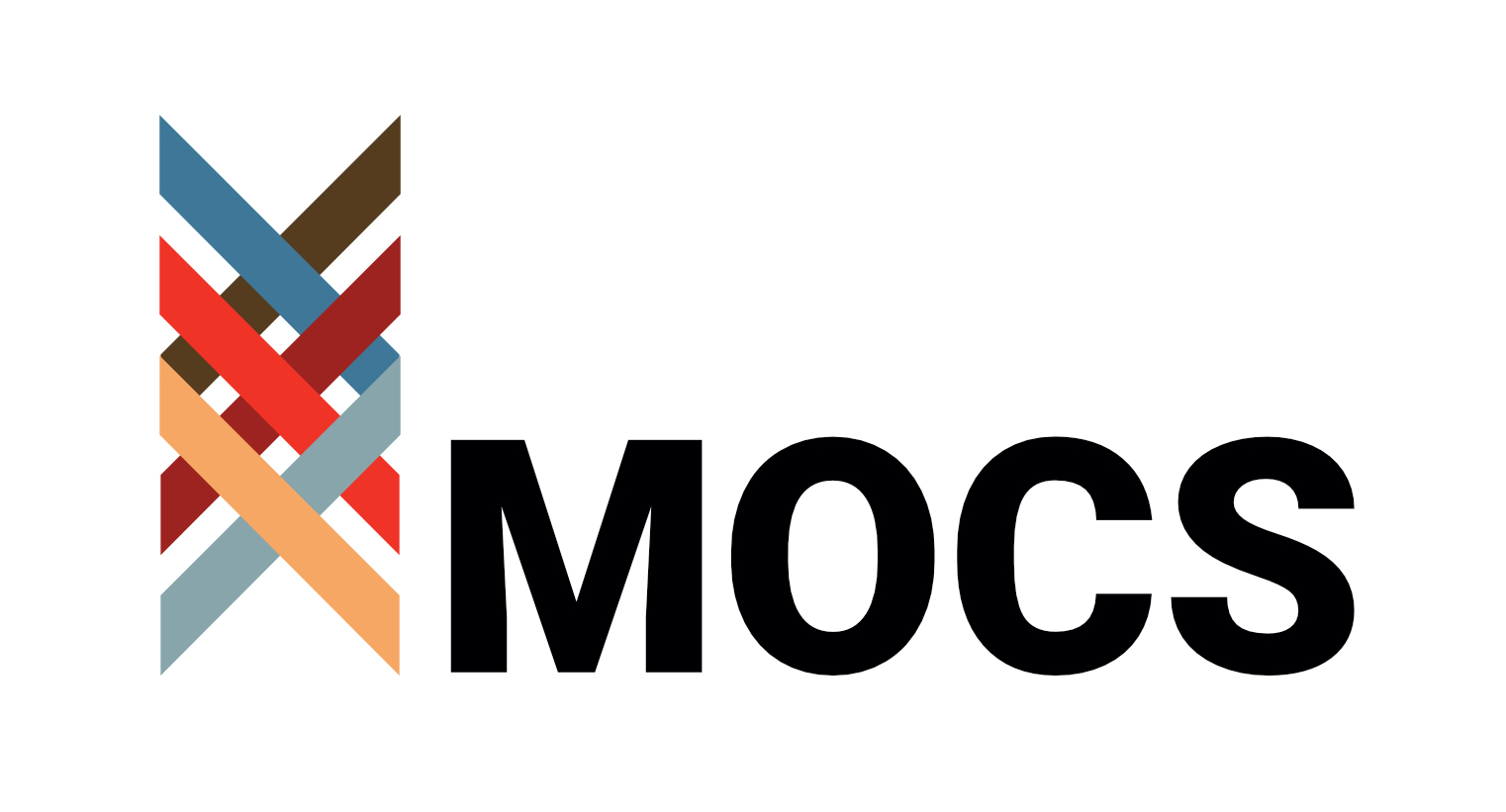BOOKS & REPORTS

The New Australian Military Sociology
Antipodean perspectives on military politics and culture
Editors: Brad West and Cate Carter
2024
In the last three decades, military sociology has centred around comprehending shifts in military organisation flowing from the breakdown of Cold War bi-polar tensions. This scholarship has been characterised by an unprecedented appreciation of the ways in which civilian culture influences and shapes military strategy and capability. However, the analytic frames mostly have reductionist qualities with civil military relations often seen as the outcome of material variables and elite interests more than being shaped by cultural factors. What is more, they are largely derived from North America, rather than being embedded in the societies being examined. We argue for a stronger analytic basis to comprehend the increasingly complex interrelations between war, military organisations and civilian cultures by an increased comprehension of civil-military relations relative to distinct national civil spheres. Our book illustrates the analytic strength of the military politics project as it relates to civil sphere theory, by presenting original and previously unpublished scholarship that we argue constitutes a ‘New Australian Military Sociology’. The key characteristics and promise of this emergent tradition is its: a) appreciation of the way military organisation uniquely reflects the civil sphere, including socio-political and geographic conditions, in which the armed forces operate within the Australian nation; b) engagement with mainstream analytic sociological debates and theories of societal transformation; and c) involvement and dialogue between university based academics and professional sociologists within the Department of Defence, including uniformed members of the Australian Defence Force. In doing so we demonstrate how the New Australian Military Sociology actively addresses the traditional dearth of research and influence on Australian civil-military relations and points to the analytic advantages of overcoming distrust between academics, Defence researchers and military officers.
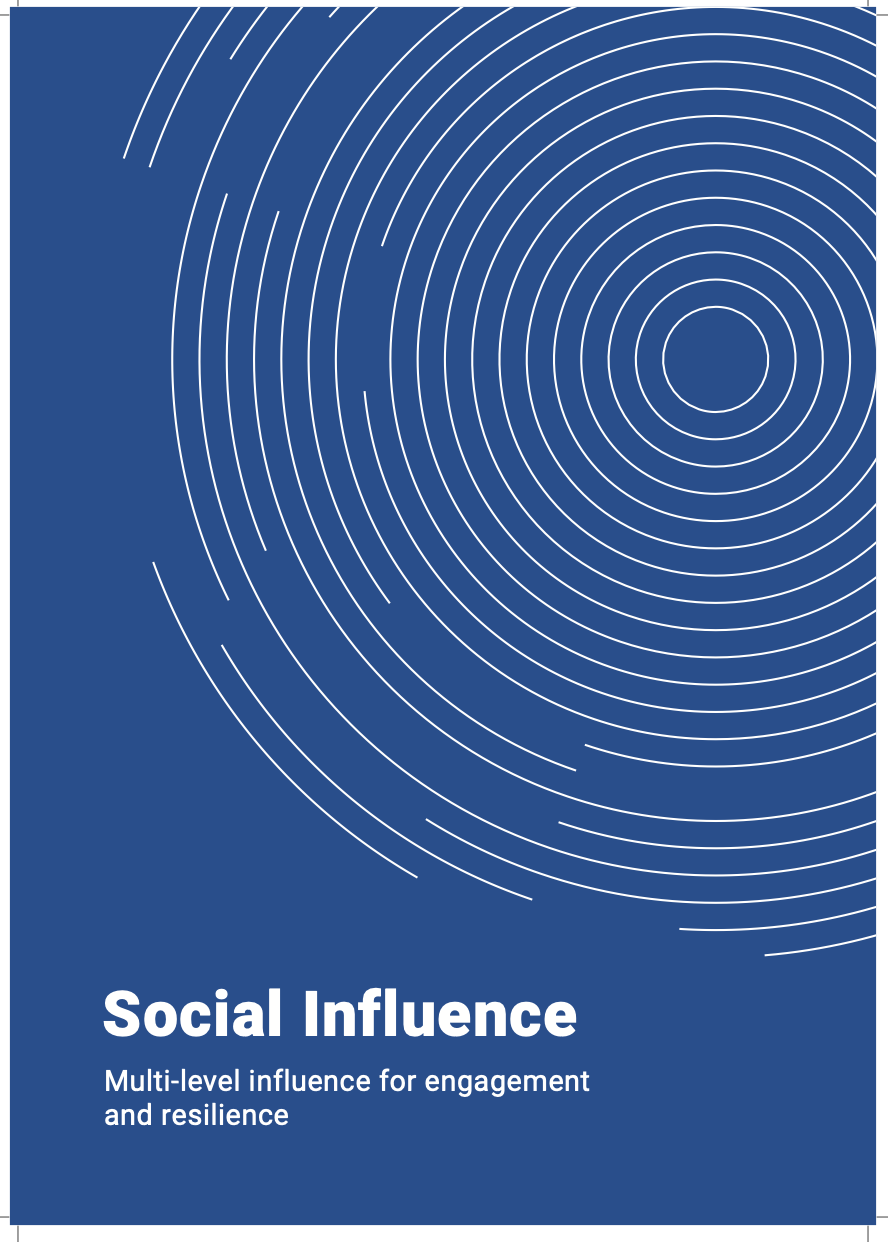
Social Influence: Multi-level influence for engagement and resilience
Authors: Brad West, Emma Thomas, Cassandra Quarisa, Damien Spry
2023
Contributors: Thomas Crosbie, Selda Dagistanli, Louis Everuss, Kristen Stevens, Elena Spasovska, Steven Talbot, Dragana Calic, Adriarne Laver, Matthew Preston
To comprehend how influence operates, this report undertakes a review of applicable social, psychological, and political science concepts, theories, and models. In doing so the report highlights key insights into how Australia and its partners can further enhance national sovereignty and address attempts at malign foreign interference.
The report details concepts of influence, exploring its forms, characteristics, and dynamics across three levels: micro (grounded in social psychology), meso (sociology) and macro (international relations). A companion report addresses the identification and measurement of influence indicators. Both reports consider factors that are significant for the development of capabilities with the means to mitigate foreign interference, to promote national values and defend national interests, and enhance international engagement and partnerships.
The report outlines factors that are significant for the development of capabilities with the means to mitigate foreign interference, to promote national values and defend national interest, and enhance international engagement and partnerships.
By exploring the dimensions and dynamics of influence, this report will aid in the identification of:
- factors that make an actor influential;
- reasons why some groups become a target;
- conditions that increase the potential for resilience to influence attempts; and
- likely responses by targets if new beliefs or orientations are adopted.
This report will assist those engaged in target audience analysis by providing a conceptual framework upon which such analysis is undertaken, and consequent planning decisions are made. The aim is to promote best practice in target audience analysis, and to stress its importance.
Good soldiers don’t rape: the Stories we wtell abotu military sexual violence
Author: Megan MacKenzie
2023
Sexual violence is a significant problem within many Western militaries. Despite international attention to the issue and global #MeToo and #TimesUp movements highlighting the impact of sexual violence, rates of sexual violence are going up in many militaries. This book uses feminist theories of ‘rape culture’ and institutional gaslighting to identify the key stories, myths, and misconceptions about military sexual violence that have obstructed addressing and preventing it. It is a landmark study that considers nearly thirty years of media coverage of military sexual violence in three case countries – the US, Canada and Australia. The findings have implications not only for those seeking to address, reduce, and prevent sexual violence in militaries, but also for those hoping to understanding rape culture and how patriarchy operates more broadly. It will appeal to students, scholars and general readers interested in gender, feminism and the military.
Martialling Peace: How the peacekeeping myth legitamises warfare
Author: Nicole Wegner
2023
The peacekeeper—impartial, disciplined, helpful and restrained in their lethal capacity—is a powerful trope. This book examines the mythology of international peacekeeping and focuses on Canada as a case study of a “peacekeeper par excellence” (Jockel, 1994) and the ways the peacekeeping myth both challenged and condoned combat activities in Afghanistan between 2001 and 2014. While Afghanistan was explicitly not a peacekeeping mission, peacekeeping mythology circulated throughout discourse about the War. The book examines the salience of the peacekeeping myth throughout twelve years of Canadian combat activities in Afghanistan as a means to illustrate the adaptability and political utility of this (inter)national myth. It examines how gender, militarism, and nationalism operated in political discourse through the War in Afghanistan to justify military force and violence in the name of peace. The book draws on the Canadian case to address a broader set of questions related to how militarism, gender, and national myths are co-constitutive in condoning military violence of so-called “peaceful” liberal nations.
Strengthening Defence and Veteran Couple Relationships through Relationship Education
Authors: Jody hughes, Luke Gahan, Jessica Smart
2023
Current and ex-serving Australian Defence Force (ADF) members face a range of pressures that may affect their capacity to build and maintain strong relationships. Relationship education can be an effective early intervention for promoting strong relationships and preventing relationship deterioration and distress. Typically designed as an early intervention for new couples who are happy and satisfied with their relationship, relationship education aims to build the relational skills required to better navigate relational challenges when they do arise. These programs have previously been offered to newly married couples in Australia and have been targeted at couples expected to face additional strains due to their social or economic environments.
Drawing on a review of existing evidence and the lived experience of current and ex-serving ADF members and their partners, the aim of this project was to identify existing relationship education programs that could be suitable for current and ex-serving ADF members, and how they might be adapted to their specific needs. The project is the first step in selecting and co-designing a relationship education program to be offered to current and ex-serving members and their partners by the Department of Veterans’ Affairs (DVA) and the Department of Defence (Defence).
This project was conducted by the Australian Institute of Family Studies and funded by the Department of Veterans’ Affairs Applied Research Program.

The geopolitics of climate and security in the Indo-Pacific
Dr Timothy Graham is an Associate Professor in Digital Media at the Queensland University of Queensland (QUT). His research combines computational methods with social theory to study online networks and platforms, with a particular interest in online bots and trolls, disinformation, and online ratings and rankings devices. He develops open source software tools for social media data analysis, and has published in journals such as Information, Communication & Society, Information Polity, Big Data & Society, and Social Media + Society.
In 2021, Tim was announced as an ARC Discovery Early Career Researcher Award recipient and was awarded funding for his project, Combating Coordinated Inauthentic Behaviour on Social Media.
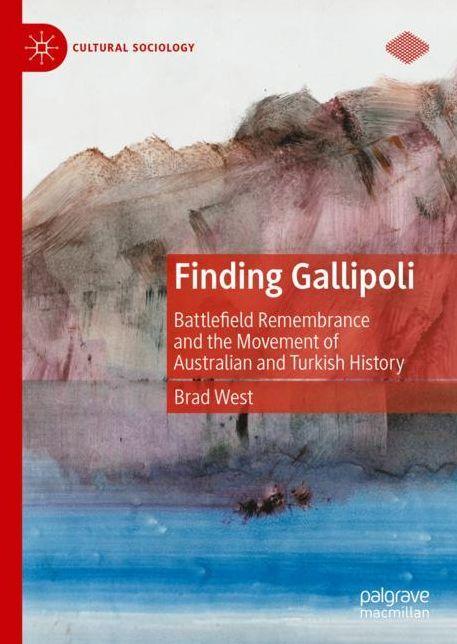
Finding Gallipoli: Battefield Remembrance and the Movement of Australian and Turkish History.
Brad West
2022
This book is about how Australian and Turkish historical understanding of the First World War Gallipoli Campaign has been shaped by travel to the battlefield for the purposes of commemoration. Utilizing a cultural historical method, the study begins with examining how cultural conceptions of travel influenced the experience of those fighting in the 1915 Battle, and ends with the way that new global insecurities and the withdrawal of Western troops from Afghanistan in 2021 is reflecting and influencing Australia and Turkey’s social memory of their military past. This wide historical lens and the author’s original fieldwork and analysis of documents allows for an in-depth exploration of the ways in which cultural patterns of social memory develop over time and mapping of how specific cultural representations in the past are reclaimed. The book argues that travel is a key factor influencing social change by providing distinctive ritual experiences that afford unique, discursive opportunities and empowering particular carriers and custodians of social memory.
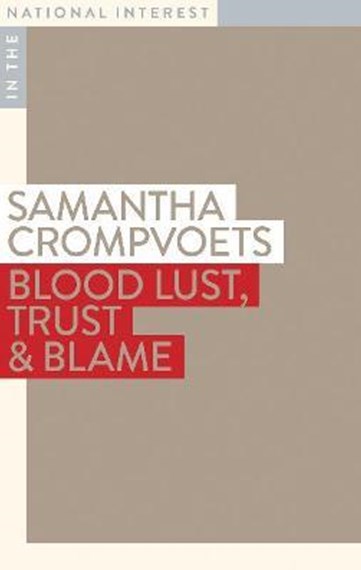
Blood Lust, Trust & Blame
Samantha Crompvoets
2021
As Australia comes to grips with accusations that some of its elite soldiers committed war crimes in Afghanistan, a catchcry for certain commentators is that the ‘fog of war’ explains, justifies and possibly excuses the alleged atrocities that have come to light. The term seeks to capture the uncertainty regarding one’s own capability, the adversary’s capability, and intent. However, the ‘fog of war’ is woefully inadequate in explaining actions that were deliberate, targeted and repeated. Abuses of power and the normalisation of deviance are at the heart of the ‘cultural issues’ that have long plagued the Australian Defence Force. In fact, this can be said of all institutions grappling with the same problems: histories of abuse and secrecy, sexual harassment, and problems of diversity and inclusion. It is always easiest to point a finger at a ‘what’ rather than a ‘who’, so ‘culture’ features prominently in analyses of what went wrong regarding the alleged war crimes committed by Australia’s Special Operations Command. But does a focus on culture provide clarity or obscurity? Does it lead to or is it a barrier to accountability? How do you know when you’ve achieved cultural change? In Blood Lust, Trust & Blame, sociologist Samantha Crompvoets tells the story of what went wrong in the ADF. It is a chronicle of the consequences of pursuing the truth, the politics of accountability, and the cost of action.
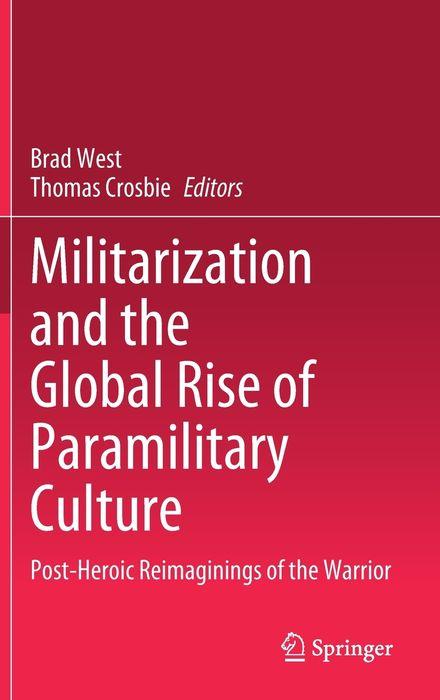
Militarization and the Global Rise of Paramilitary Culture
Editors: Brad West and Thomas Crosbie
2021
This edited book demonstrates a new multidimensional comprehension of the relationship between war, the military and civil society by exploring the global rise of paramilitary culture. Moving beyond binary understandings that inform the militarization of culture thesis and examining various national and cultural contexts, the collection outlines ways in which a process of paramilitarization is shaping the world through the promotion of new warrior archetypes. It is argued that while the paramilitary hero is associated with military themes, their character is in tension with the central principals of modern military organization, something that often challenges the state’s perceived monopoly on violence. As such paramilitization has profound implications for institutional military identity, the influence of paramilitary organizations and broadly how organised violence is popularly understood.
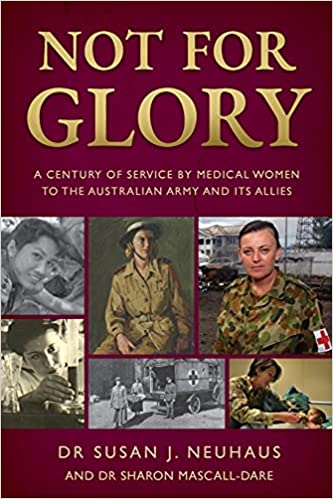
Not for Glory: A century of service by medical women to the Australian Army and its Allies
Susan J. Nehaus and Sharon Mascall-Dare
2021
From the trenches of the Western Front to the ricefields and jungles of South-east Asia, Australian women have served as doctors and medical specialists from World War I until the present day.
This book tells their stories of adventure, courage, sacrifice and determination as they fought to serve their country … and won.

Modern Deterrance
Paul Arbon, Robert Muller, Roberta Crouch, Paul Barnes, Allison Bourke, Alexei Filinkov, Richard Nunes-Vaz, Daniel Bilusich, Glenn Varona
2021
The global security environment has changed and is characterised by greater complexity, interconnectedness and interdependence. Australia’s defence policy is being adjusted to account for the re-emergence of great power competition, actions by non-state actors, possible disruptive technologies, and the ways our interests may be threatened other than by use of force. These changes have invigorated discussion on deterrence in the contemporary and future operating environments.
Defence faces challenges in achieving a credible and sustainable deterrence effect using military power. However, deterrence is not achieved by military power alone, and modern threat scenarios feature hybrid threats with increased likelihood of cascading and unexpected consequences. This report considers how the Australian Defence Force can contribute to deterrence in an era of strategic competition that involves threats such as coercion, espionage, sabotage, and subterfuge. A key focus of the research is the contributions Defence might provide in a whole-of-government approach to deterrence, and if we can assess the sustained effect of those contributions in a holistic manner.
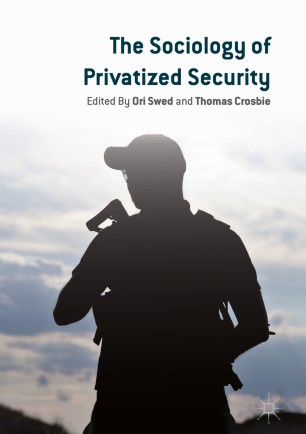
The Sociology of Privatized Security
Editors: Ori Swed and Thomas Crosbie
2019
The Sociology of Privatized Security presents a global view of the issue of privatized security, delving into diverse and illustrative cases from different geographic and political contexts. This book overviews the historical shift toward privatized security and private involvement in militarized conflict, including war. A rare sociological examination of violence, security contractors, and our assumptions about privatized security in the global sphere
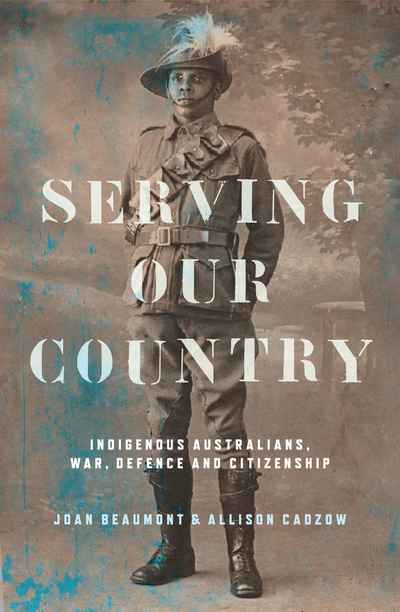
Serving our Country: Indigenous Australians, war, defence and citizenship
Editors: Joan Beaumont and Allison Cadzow
2018
After decades of silence, Serving Our Country is the first comprehensive history of Aboriginal and Torres Strait Islander people’s participation in the Australian defence forces.
While Indigenous Australians have enlisted in the defence forces since the Boer War, for much of this time they defied racist restrictions and were denied full citizenship rights on their return to civilian life. In Serving Our Country Mick Dodson, John Maynard, Joan Beaumont, Noah Riseman, Allison Cadzow, and others, reveal the courage, resilience, and trauma of Indigenous defence personnel and their families, and document the long struggle to gain recognition for their role in the defence of Australia.
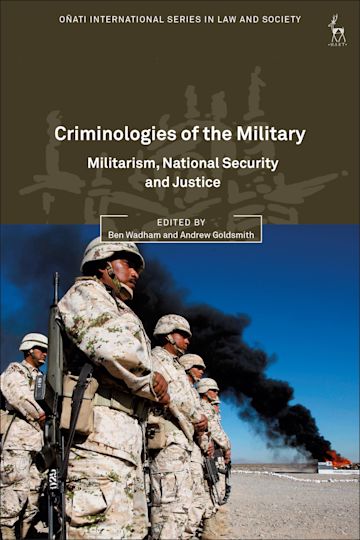
Criminologies of the Military
Militarism, National Security and Justice
Editors: Ben Wadham and Andrew Goldsmith
2018
This innovative collection offers one of the first analyses of criminologies of the military from an interdisciplinary perspective. While some criminologists have examined the military in relation to the area of war crimes, this collection considers a range of other important but less explored aspects such as private military actors, insurgents, paramilitary groups and the role of military forces in tackling transnational crime. Drawing upon insights from criminology, this book’s editors also consider the ways the military institution harbours criminal activity within its ranks and deals with prisoners of war. The contributions, by leading experts in the field, have a broad reach and take a truly global approach to the subject.
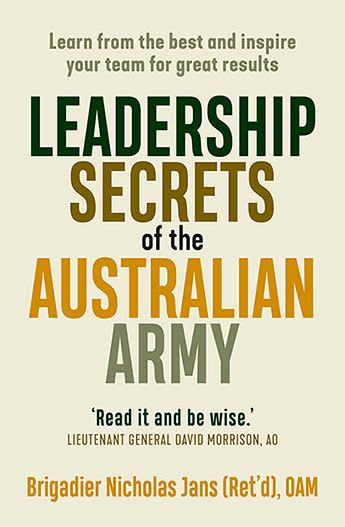
Leadership Secrets of the Australian Army
Nicholas Jans
2018
Nicholas Jans identifies the distinctive egalitarian leadership principles behind the effectiveness of the Australian defence forces, and shows how they can be applied in any organisation at any level
Australia’s military consistently punches above its weight, and its approach to leadership is the key to its success. Developed over a century ago by fusing national values with battlefield imperatives, its approach has been fine-tuned over generations. It is now an adaptable and egalitarian leadership culture that ticks all the boxes for best practice.
The military assumes no-one is born a natural leader, and that good training makes good leaders. Drawing on his own long military career and defence training programs, and on research, Nick Jans has identified the core principles of this consistently successful approach to leadership. These ‘3Rs’ are the leadership skills which generate loyalty and commitment at an operational level, and they are just as successful in everyday team management as they are in the field.
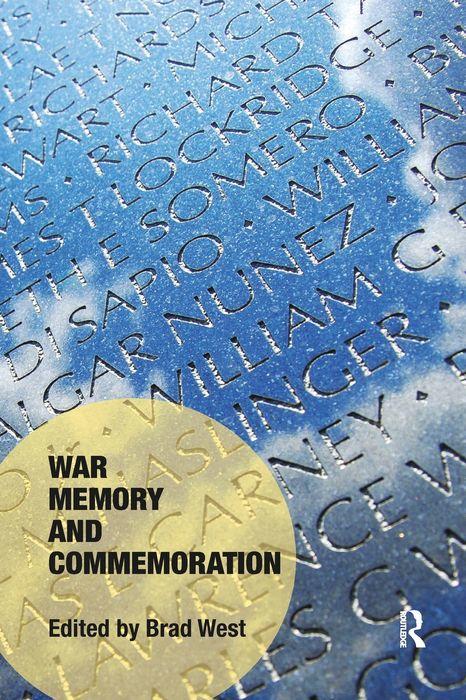
War Memory and Commemoration
Editor: Brad West
2017
In a period characterised by an unprecedented cultural engagement with the past, individuals, groups and nations are debating and experimenting with commemoration in order to find culturally relevant ways of remembering warfare, genocide and terrorism.
This book examines such remembrances and the political consequences of these rites. In particular, the volume focuses on the ways in which recent social and technological forces, including digital archiving, transnational flows of historical knowledge, shifts in academic practice, changes in commemorative forms and consumerist engagements with history affect the shaping of new collective memories and our understanding of the social world.
Presenting studies of commemorative practices from Africa, Asia, Australia, Europe and the Middle East, War Memory and Commemoration illustrates the power of new commemorative forms to shape the world, and highlights the ways in which social actors use them in promoting a range of understandings of the past. The volume will appeal to scholars of sociology, history, cultural studies and journalism with an interest in commemoration, heritage and/or collective memory.
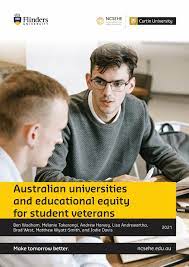
Australian Universities and Educational Equity for Student Veterans
Ben Wadham, Melanie Takarangi, Andrew Harvey, Lisa Andrewartha, Brad West, Matthew Wyatt-Smith and Jodie Davis
2021
This report draws upon a small but growing scholarship on student veterans in Australia. Two recent projects and studies led by La Trobe University in conjunction with the Australian Student Veterans Association (ASVA) (Harvey, Andrewartha, Smith, & Wyatt-Smith, 2018) and the Australian Catholic University (ACU), Charles Darwin University (CDU), and Western Sydney University (WSU) (Harvey, Andrewartha, et al 2020) have established a platform for ongoing research and reform in the area of military/civil transition and student veterans. From that work, we know that transition from the military is often a challenging time for veterans. Challenges may include the loss of community and friendships, previous roles or status, dealing with the impacts of service on psychological and physical health, and the radical change from being an integral part of a cohesive, constraining environment to an individual in a civilian society
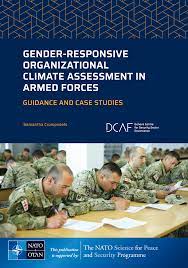
Gender-Responsive Organizational Climate Assessment in Armed Forces: Guidance and Case Studies
Samantha Crompvoets
2019
This guide aims to collate and share knowledge and experience from NATO, NATO Partners, and other armed forces regarding good practice when developing, implementing, and evaluating a gender-responsive organizational climate assessment.
The guide is structured in five parts to describe the why and how of undertaking an organizational climate assessment in armed forces. It provides step-bystep advice, along with case study examples, for progressing your climate assessment from thought to action. It also gives guidance to ensure that your climate assessment integrates a gender perspective or mainstreams gender – that is, the assessment is gender responsive.
